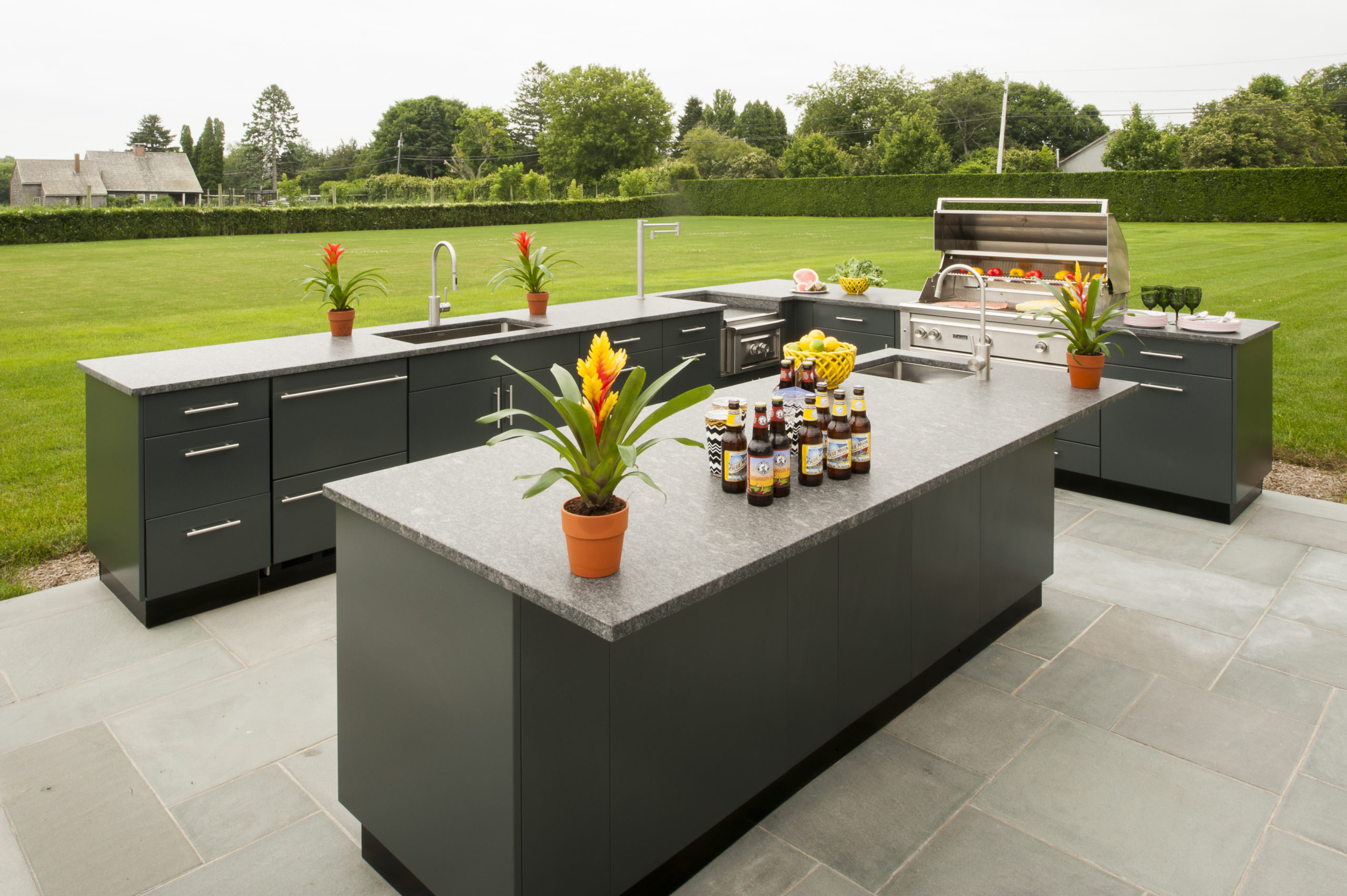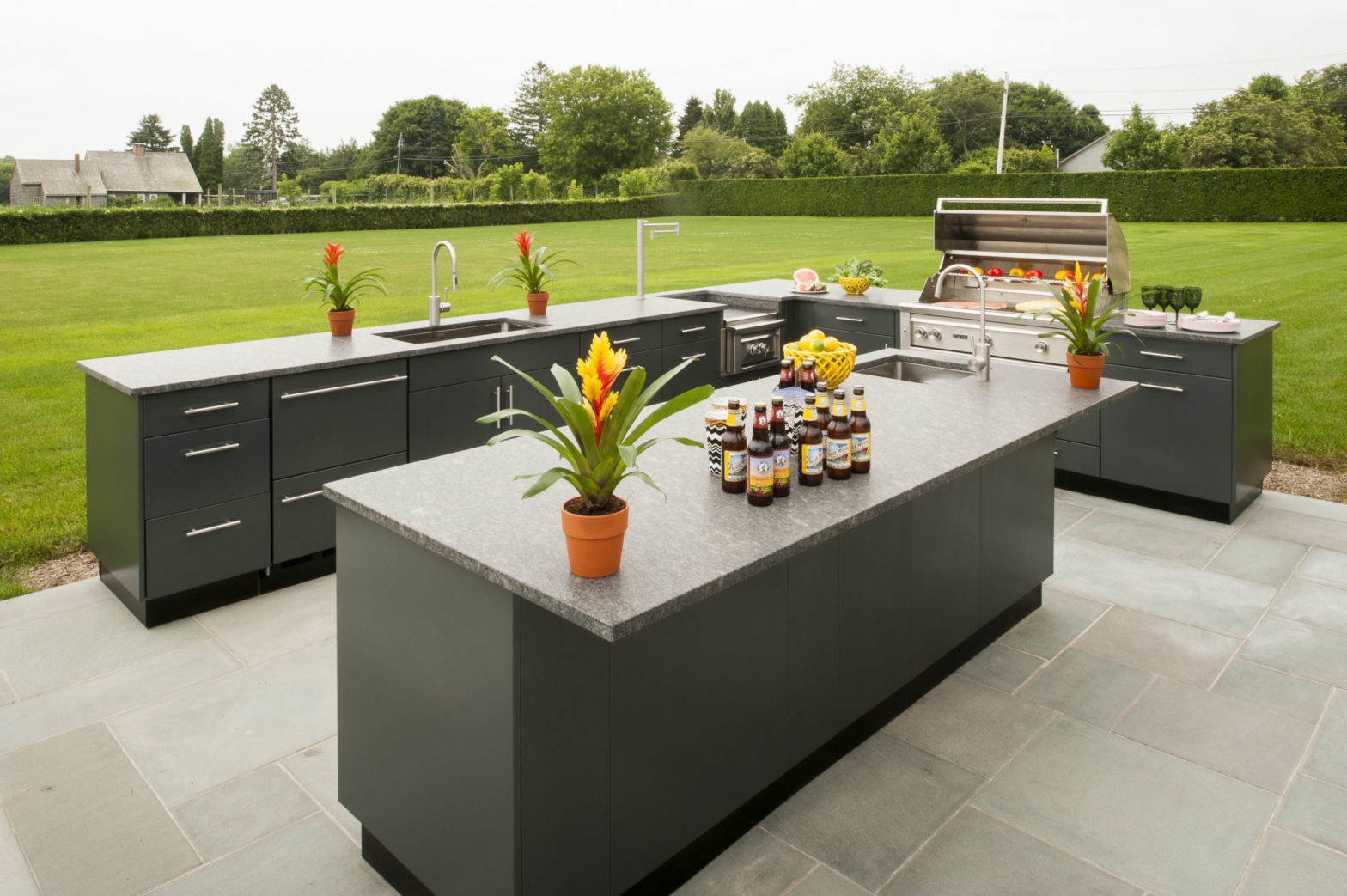
From layout choices to material selection, designing an outdoor kitchen has plenty of details to think about. When choosing the countertop material that is best for your outdoor kitchen, you should consider factors like color and finish options, durability in the outdoors, and maintenance. To make your choice easier, here are some popular outdoor kitchen countertop materials and the pros and cons of each.
Outdoor Kitchen Countertop Materials
As with indoor kitchens, outdoor countertops can be made of materials like granite, tile, quartzite, concrete, and soapstone. While all countertops require regular maintenance and cleaning, each outdoor kitchen countertop material has pros and cons that will need to be considered when making your selection.
Granite
Granite is one of the easiest and most attractive materials for an outdoor kitchen countertop. It performs well in the heat, although darker colors will certainly be hotter to the touch. It can also be sealed to protect it against stains and mold. You can even reseal it periodically to ensure that it lasts you a long time. Granite is available in many colors and styles to suit any aesthetic and should not fade in the sun. The main drawbacks of a granite countertop are the higher cost and the maintenance, as resealing it is highly recommended.
Tile
Like granite, tile is available in a multitude of colors and finishes. It can even mimic stone finishes while reducing the drawbacks of natural stone. Porcelain tile is especially attractive for countertops, as it is non-porous and durable, so you will not need to worry about stains when preparing food. It is resistant to heat and will even withstand the cold. The main drawback of tile is that it is capable of chipping, scratching, or breaking. Replacing parts of a tile countertop may be difficult when trying to match, so keep that in mind.
Quartzite
Quartz is a man-made material that is a popular choice for indoor countertops, but it does not hold up well in the outdoors. The resin can turn yellow over time when exposed to the outdoor elements. An alternative, called quartzite, is an option, as it is like granite and looks just like marble without the drawbacks of quartz. As such, it will not fade or discolor in the sun. However, it can stain, and it cannot withstand high temperatures, so you will need extra protection when placing hot pots and pans on the countertop surface. You can also seal quartzite to maintain its durability.
Concrete
Concrete is a very versatile and durable material, as it can be poured into many shapes so you can easily fit your kitchen’s exact dimensions. It can also be decorated with tiles and stones, and it can be stained virtually any color. The issue is that sunlight could fade the color if it is not placed under shade. A concrete countertop can also be tricky to install, as it can crack during installation or even over time if it is not sealed. It is a porous material as well, so sealing prevents stains, bacterial growth, and cracking.
Soapstone
Unlike concrete, soapstone is non-porous. As such, it does not need to be sealed against stains. However, this dark stone countertop will darken even more if not cleaned regularly. Mild soap and water will do the trick. Applying oil regularly will provide protection and a dark and beautiful shine. Be mindful that soapstone is soft, although any scratches or nicks can be easily buffed out with sandpaper. Since it is dark it can be hot to the touch, but it is otherwise resistant to heat, cold, and any weather effects.
Marble
Marble is typically suited for the indoors only, although it can work for an outdoor kitchen. If it is exposed to the outdoor elements, it will need to be sealed regularly, as the finish will wear away over time. If you want to use a marble countertop but do not want the maintenance, the stains will easily be washed away by the rain. It is a durable stone, so limiting your maintenance will still leave a workable and attractive, albeit weathered, countertop surface.
Slate
Slate is another extremely durable material, although it is tricky to use. Since the durability varies so much between slabs, you may end up with a piece that can withstand stains or a piece that is more porous and susceptible to cracking, staining, and scratching. A sealant and regular cleaning will help with durability. However, a denser slab of slate may not need to be sealed. Remember that slate is soft as well, so chipping can occur. Any scratches can be removed quite easily, and slate is very resistant to heat. The main consideration is that a slab of slate that is higher quality, denser, and easier to maintain will be pricier.
Wood
Wood typically does not hold up well in the outdoors, so it is not recommended as a great choice for a countertop that is exposed to the weather. It does have advantages if it is being used in an enclosed space, as it is a very hard and strong material, and it can be stained any color. It can also be sealed for additional protection. Some species of wood are naturally resistant to mold, insects, and some weather conditions too, so keep that in mind. Wood can handle both heat and cold, although you will need to take extra precautions for any fire risks.
The Best Material for Outdoor Countertops
Ultimately, the best material for your Trex® Outdoor Kitchens™ countertops will be durable and long-lasting, with an abundance of colors and finish options. After all, you will want your countertop to last the lifetime of your outdoor kitchen. After discussing the pros and cons of each material, you should consider which material and color will work best for your outdoor kitchen.
We recommend choosing outdoor countertops that suit your particular lifestyle. Most countertop materials remain durable with regular maintenance. For the best results, choose outdoor kitchen countertops that have the following features:
- UV resistance for color stability outdoors
- Exceptional strength
- High resistance to impacts, scratches, and abrasions
- Non-porosity – requiring no maintenance
Besides for features, also consider the colors that will work for your space. The Trex Outdoor Kitchens powder coat finishes offer an excellent opportunity to enhance the aesthetic in your outdoor space and complement the countertop colors that you choose. Consider these color options:
- Light Grey & White – Light colors create a modern and sophisticated look with soft and clean lines.
- Gold & Bronze – If you are looking to create a cozy outdoor atmosphere, look no further than these warm color options.
- Beige & Taupe – Consider neutral colors like beige and taupe for an elegant outdoor space.
- Dark Grey & Black – You cannot go wrong with black or dark grey. They pair well with any colors.
Regardless of the outdoor kitchen countertop material you choose, be mindful of maintenance requirements and choose a color that will complement your space. This helpful guide will make your countertop choice easier as you plan and design your dream outdoor living space.

